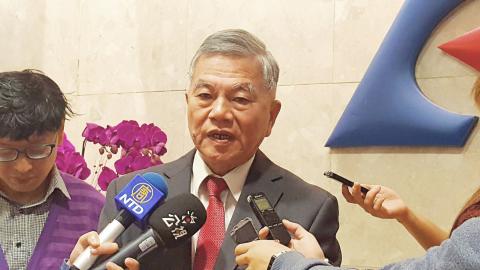Minister of Economic Affairs Shen Jong-chin (沈榮津) yesterday called on the Taichung City Government to conform to the law after it threatened to revoke up to two of the Taichung Power Plant’s operating licenses due to excessive coal use.
The city government earlier yesterday also fined state-run Taiwan Power Co (Taipower, 台電), which operates the power plant, NT$3 million (US$98,338), because the plant has used 11.08 million tonnes of coal since the beginning of this year, exceeding the maximum of 11.04 million tonnes stipulated by the Taichung Autonomous Act for Coal Regulation (台中市管制生煤自治條例).
The city government also demanded improvements from Taipower within 10 days, saying it would revoke the operating licenses for one to two of the plant’s 10 coal-fired generators, if the utility failed to do so.

Photo: Lin Ching-hua, Taipei Times
“Claiming a clerical error [on permits issued in 2017], the Taichung City Government has raised the bar on coal-use standards for Taipower, which does not conform to legal procedures,” Shen told reporters on the sidelines of an awards ceremony at the ministry’s auditorium in Taipei.
Revising a previous request that Taipower reduce its coal use by 40 percent starting from Jan. 26, the city government last month altered the deadline to Jan. 25.
“Electricity [from the Taichung Power Plant] is for everyone’s use ... I hope that the Taichung City Government will stop making things difficult for civil servants, as a steady electricity supply remains the people’s number one priority,” Shen said.
Taipower has reduced coal use by 5 million tonnes over the past few years to reduce air pollution, Shen said, adding that the Taichung plant only contributes to one of the nation’s pollution problems.
While the company has yet to receive an official notice from the city government, Taipower spokesman Hsu Tsao-hua (徐造華) told the Taipei Times by telephone that it would appeal the decision.
According to the 2017 permits, the company has the right to use up to 16 million tonnes of coal per year at the Taichung Power Plant, but it would strive to reduce its coal use to less than 13 million tonnes by the end of the year, Hsu said.
“Unfortunately the Taichung City Government has not provided us with any guidelines to further improve on coal use,” Hsu said, adding that the revocation of two operating licenses would lead to a 3 percent decline in Taipower’s energy operating reserve margin.
“By putting a stop to two coal-fired units of 550 megawatts each, we would have trouble maintaining an operating reserve margin above 10 percent, which is much needed in events such as routine inspections, repairs or other emergencies,” he said.
The company would nevertheless strive to lower the plant’s coal use to 12.6 million tonnes for next year, Hsu said.

Intel Corp chief executive officer Lip-Bu Tan (陳立武) is expected to meet with Taiwanese suppliers next month in conjunction with the opening of the Computex Taipei trade show, supply chain sources said on Monday. The visit, the first for Tan to Taiwan since assuming his new post last month, would be aimed at enhancing Intel’s ties with suppliers in Taiwan as he attempts to help turn around the struggling US chipmaker, the sources said. Tan is to hold a banquet to celebrate Intel’s 40-year presence in Taiwan before Computex opens on May 20 and invite dozens of Taiwanese suppliers to exchange views

Application-specific integrated circuit designer Faraday Technology Corp (智原) yesterday said that although revenue this quarter would decline 30 percent from last quarter, it retained its full-year forecast of revenue growth of 100 percent. The company attributed the quarterly drop to a slowdown in customers’ production of chips using Faraday’s advanced packaging technology. The company is still confident about its revenue growth this year, given its strong “design-win” — or the projects it won to help customers design their chips, Faraday president Steve Wang (王國雍) told an online earnings conference. “The design-win this year is better than we expected. We believe we will win

Chizuko Kimura has become the first female sushi chef in the world to win a Michelin star, fulfilling a promise she made to her dying husband to continue his legacy. The 54-year-old Japanese chef regained the Michelin star her late husband, Shunei Kimura, won three years ago for their Sushi Shunei restaurant in Paris. For Shunei Kimura, the star was a dream come true. However, the joy was short-lived. He died from cancer just three months later in June 2022. He was 65. The following year, the restaurant in the heart of Montmartre lost its star rating. Chizuko Kimura insisted that the new star is still down

While China’s leaders use their economic and political might to fight US President Donald Trump’s trade war “to the end,” its army of social media soldiers are embarking on a more humorous campaign online. Trump’s tariff blitz has seen Washington and Beijing impose eye-watering duties on imports from the other, fanning a standoff between the economic superpowers that has sparked global recession fears and sent markets into a tailspin. Trump says his policy is a response to years of being “ripped off” by other countries and aims to bring manufacturing to the US, forcing companies to employ US workers. However, China’s online warriors